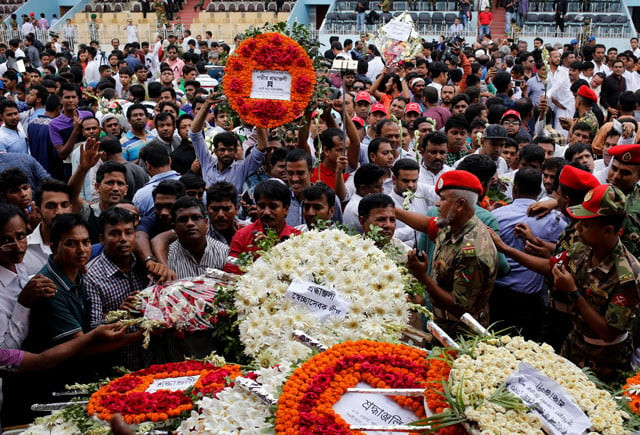Uniqlo bans Bangladesh travel after extremist killings
Uniqlo is one of about 240 Japanese firms with offices in Bangladesh

People pay tribute to the victims of the attack on the Holey Artisan Bakery and the O'Kitchen Restaurant, in Dhaka Bangladesh, July 4, 2016. PHOTO: REUTERS
Tokyo-based Fast Retailing, which operates Uniqlo, said it had told 10 Japanese employees not to leave their houses "until further notice", a company spokesperson said.
The clothing giant added that it was cancelling all but vital travel to the South Asian country after 20 hostages were killed when heavily armed gunmen stormed an upmarket eatery in Dhaka.
Seven Japanese nationals were among the dead, which also included Italians, an Indian and a US citizen.
Seven Japanese confirmed dead in Bangladesh attack
Fast Retailing has nine Grameen Uniqlo retail stores around Dhaka, where some of the employees work, and a production office, which coordinates with local producers, the spokesperson said.
"We have taken necessary security procedures," she added. "Obviously we are taking this situation seriously."
Uniqlo is one of about 240 Japanese firms with offices in Bangladesh.
Engineering conglomerate Toshiba said it has ordered staff to avoid non-essential travel to Bangladesh until July 10, a company spokesperson said.
Toshiba, which said it had "a few" employees in Dhaka, had earlier warned staff against business trips outside the capital. Dhaka was added to the list after this weekend's attack.
Several Japanese companies, including general contractors Obayashi and Shimizu, have reportedly ordered employees in the country to stay at home.
US State Department says US citizen killed in Bangladesh attack
The five Japanese men and two women killed in the attacks were involved in development projects with the government-run Japan International Cooperation Agency (JICA).
Although a quarter of its 160 million people still live below the poverty line, Bangladesh has clocked growth of around six per cent nearly every year since the turn of the millennium.
That's largely thanks to garment exports, the lifeblood of its economy, accounting for more than 80 per cent of total outbound goods last year.
Between them the nation's clothing factories employ more than four million people, most of them impoverished rural women.



















COMMENTS
Comments are moderated and generally will be posted if they are on-topic and not abusive.
For more information, please see our Comments FAQ